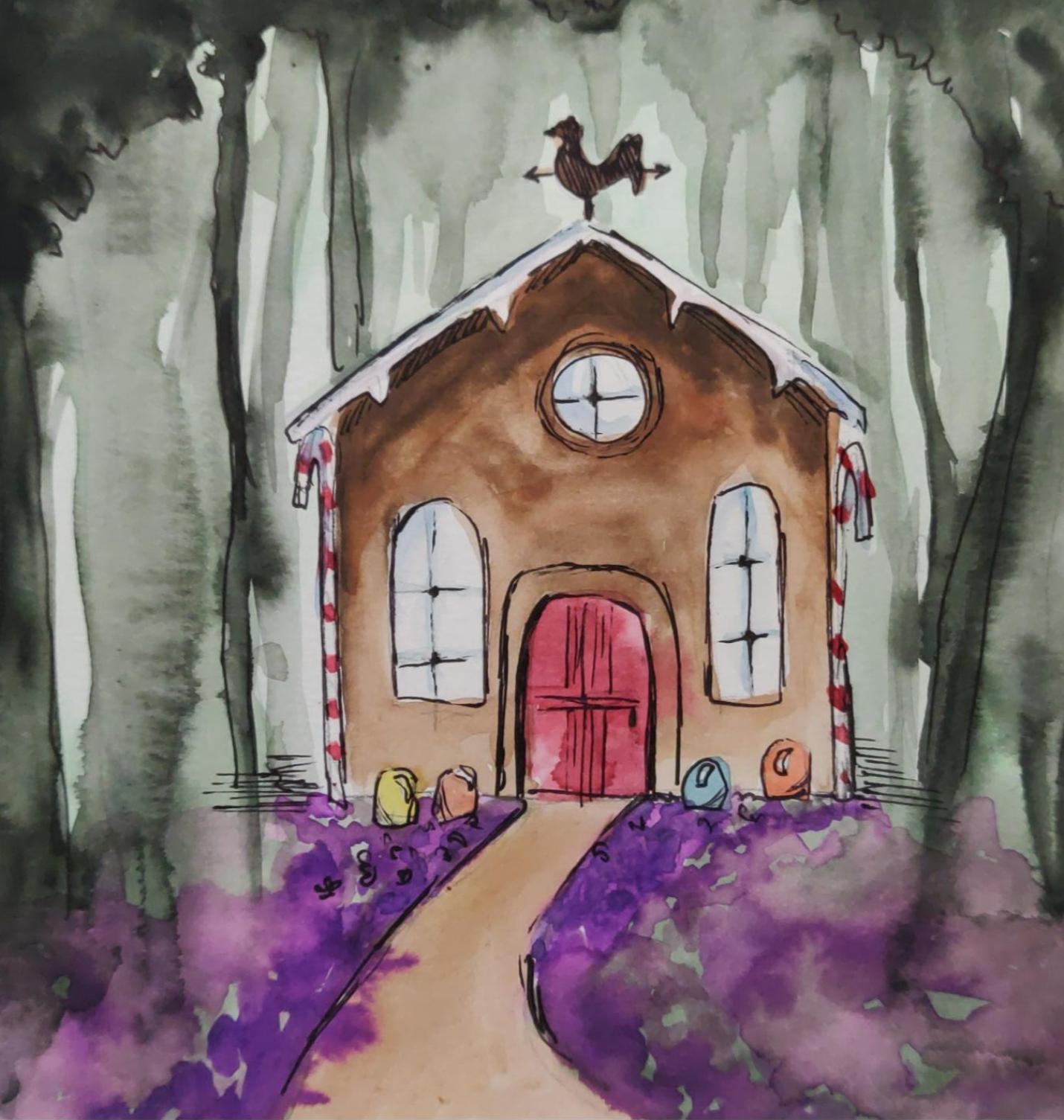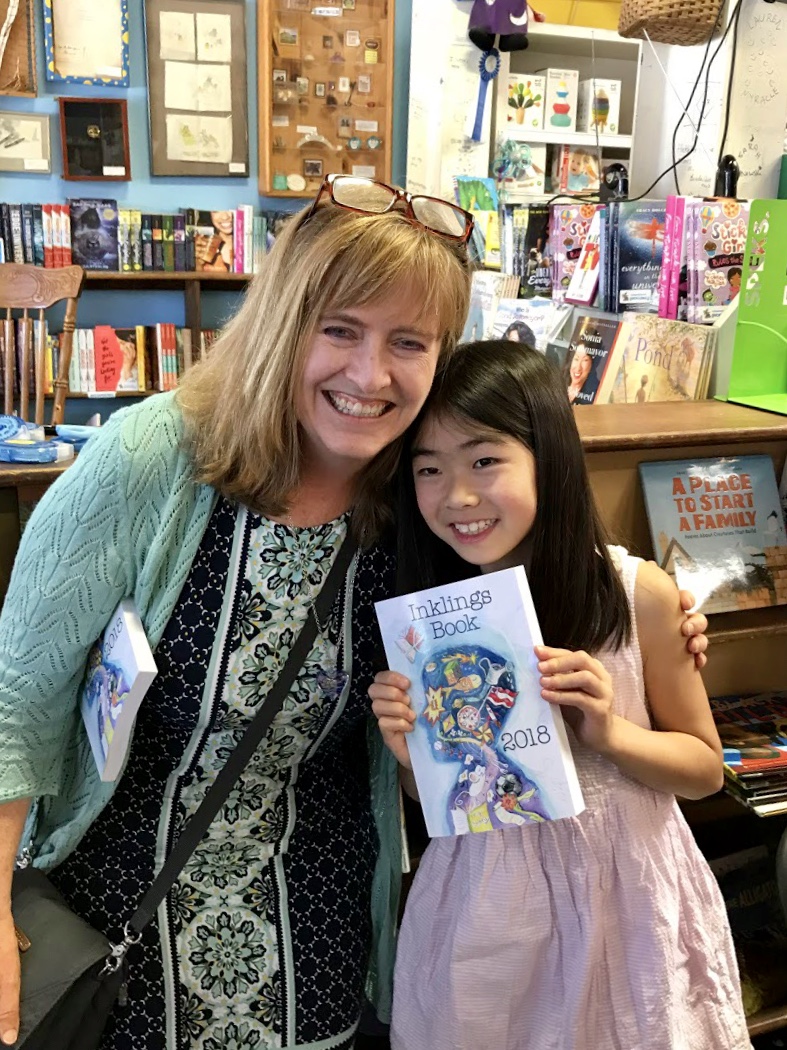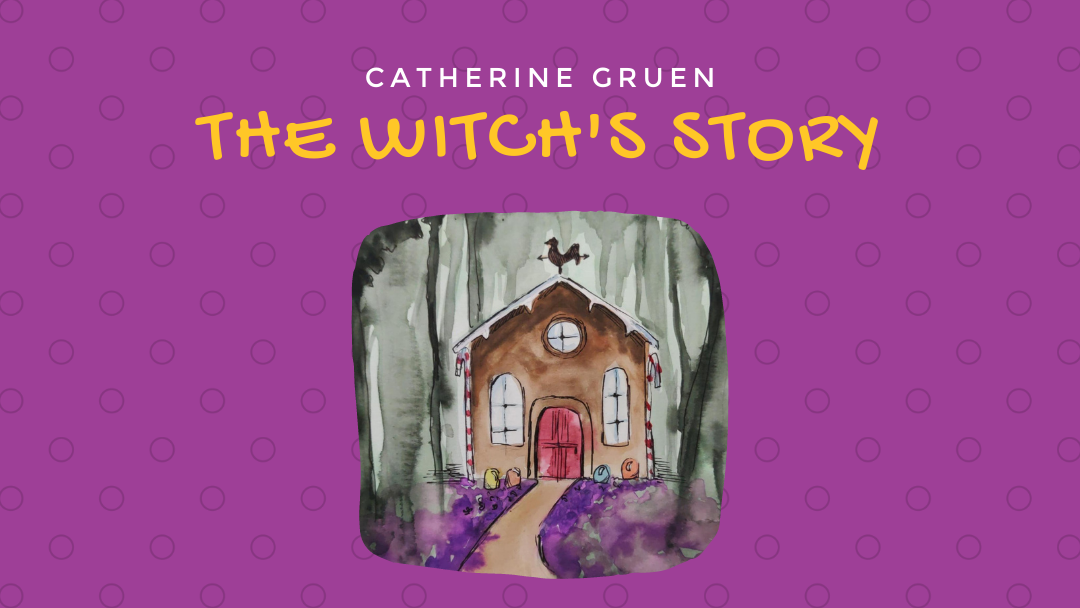Today we are featuring Inklings Book Contest 2021 finalist, Catherine Gruen! Catherine finished 8th grade this past school year. Her story is called “The Witch’s Story” and is a retelling of “Hansel and Gretel” from the point of view of the witch. Catherine shared with us a beautiful, original image she created to go along with her story. Scroll down to the end to see it full-sized. Happy reading!
The Witch’s Story
By Catherine Gruen
Lily was my name. And like the soft, delicate flower, I was beautiful. The German forest sang and danced with pleasure in its youth. I thought we would live forever.
Beauty, strength, and freedom were ours.
We would sing beneath the thick canopy of trees, the sharp, sweet-smelling pine scent filling our lungs, as I breathed in clean mountain air.
I belonged to the forest; the forest belonged to me.
Together, we were one.
Then the others came. They claimed the land was their own. Said the trees made for good wood which made for good business. Tore me apart from the forest so I had to keep climbing, climbing, climbing, until I was above the mist and the trees.
A river ran through the trees where I now lived.
A clear river sweeping through with freedom, like I once had.
I built myself a cabin, using my magic to form its spice-bread walls. The candy canes dripped with mint-like crisp winter air, and the frosty window panes were formed from melted sugar. Gumdrops were the rocks and ribbon candy was the curtains. Sugar-coated violets lined the path to the free-running river.
I was not beautiful anymore.
I wasn’t like the lily for which I was named.
I was hideous.
I was a monster, the kind of monster that claws at the walls of its prison, yearning to tear free and crazed by the thought of it. I was the kind of monster that lurks in the shadows, which fears to show its face, to be scorned for the beauty that left her. The kind of monster that lives inside of itself, like a pearl inside a clam.
My life had been a pearl.
Not anymore.
I had lived a dream.
Now I would become a nightmare.
The children came. I knew they would. They reached for the spice-bread and the sugared flowers. From inside my house, I could hear them eating and laughing like they had been invited to a feast at a king’s palace. My eyes were a red-rimmed blue, and images had become blurry before my eyes, but I knew children when I smelled them.
“Nibble, nibble, like a mouse,” I called to them.
Every time, they froze, but when I didn’t continue, they called it the wind or the river or the birds. So they kept eating.
“Who’s that nibbling at my house?” I would finish. Then I would open the door. They looked horrified to see me, but I got used to that.
I welcomed them into my house. I fed them dinner. The favor would be returned later when they would feed me.
When their smiling tired heads laid to rest on the bed, I would laugh. They were so gullible.
Parents started to warn their children about me. I was the old witch, the one named Lily, who looked hardly like the beautiful flower, who lived alone deep in the woods and enticed children, and who trapped them and ate them, like a beast.
How they got the story so accurate, I’ll never be able to guess.
I don’t know when it changed, when anger morphed into rage. I don’t know when I became the monster, the old witch in the legends. But it happened.
I know it did.
One day, there was a girl and a boy who stopped to eat at my house. And somehow, they were different. When they came in, they accepted the food like the children always did, but they were polite, even offering to help with the dishes.
Maybe their mother was the kind who cooed over them. Maybe their father bragged about them in every conversation.
Maybe their parents were the kind that left them alone to fend for themselves.
I did not ask the children why they were alone in the woods. They didn’t offer the information.
As the girl slept, I took the boy from under the covers, leading him to the stable.
“Who are you?” he demanded. He fought, but I was stronger. Anyone who has magic like I do is stronger. I pushed him into the cage, locking the door. When the girl woke, there was nothing she could do for him.
Oh, she protested. She broke a mirror and cracked a window, until, defeated, she shook the bars of her brother’s cage and cried.
“Gretel,” I told her, “you work for me now. Fetch the water and cook something nice for your brother.”
The girl knew her way around a kitchen.
Her mother had probably taught her since she could toddle.
Gretel had only crumbs to eat. Hansel had enough to feed all the people in the famine-filled land.
But he must have been refusing to eat, or he couldn’t eat, or something. I had felt his finger. He was bone-thin. Four weeks passed. Still bone-thin.
The children’s parents probably thought they were dead.
Maybe they had called the village together and they were searching the darkest reaches of the forest.
Maybe they had given up completely and buried empty coffins, dressed in black coats and veils.
Maybe they didn’t care. Maybe they thought it served them right anyway for running off.
I had waited long enough for Hansel to fatten.
“Be he fat or lean, I will kill and cook him tomorrow,” I told Gretel. I knew Hansel could hear me. I could almost smell their fear.
The girl rushed outside with the pail but fell to her knees before the well, her hands folded, praying, “Dear God, please help us.”
“Spare me your lamentations,” I called angrily at her.
She looked back at me. Her tear-filled eyes narrowed in hate.
Before the crack of dawn the next morning, I roused her. “I have heated the oven and kneaded the dough. Creep in,” I said.
Her face began to crumple when she realized what I meant.
I had never felt pity before.
“Creep in,” I said again. “And – and see if it is properly hot, so the bread might be baked.”
“I don’t know how to do it,” she said evenly. “How shall I get in?”
“Stupid goose!” I shouted.
These were the people who had hated me and taken me from the German forests. They had stolen everything I loved; they had taken from me beauty and strength and freedom. It was their fault I was no longer beautiful. It was their fault I was hideous. It was their fault I ate their children, that I was a monster.
“The opening is big enough!” I yelled. “Don’t you see? It’s big enough for me! I could fit in!”
I couldn’t fit in.
I was a monster.
They were angels.
I stuck my head partway in the oven, feeling the heat from the flames.
It wasn’t their fault I was a monster. Maybe we were all monsters, we all had something we feared and we hated. We all had something we fought our hardest to forget or to hide.
It wasn’t their fault I was a monster.
I know that now.
The fault was mine.
The flames curled over my head as Gretel barred the oven door shut. She ran to her brother, crying tears of joy like only children can, while they have beauty and strength and freedom.
“Hansel!” she shouted, her voice sounding miles away.
The fault was mine.

Support the Inklings Book Contest Today!
Your support of the Inklings Book Contest helps us connect with youth writers and provide them with free learning opportunities throughout the contest – as they prepare, as they enter, and as they revise their work as winners and finalists.
Will you support the next generation of writers as they find their voices and make their mark on the world?



